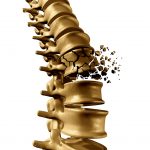Concerned with brittle bones? Discover 4 natural ways to support bone health
 (NaturalHealth365) Osteoporosis, characterized by porous, brittle bones, and low bone mass currently affects 54 million Americans – with potentially debilitating consequences. Because this age-related condition often shows no symptoms, many people do not realize they have it until a sudden bone fracture occurs.
(NaturalHealth365) Osteoporosis, characterized by porous, brittle bones, and low bone mass currently affects 54 million Americans – with potentially debilitating consequences. Because this age-related condition often shows no symptoms, many people do not realize they have it until a sudden bone fracture occurs.
According to the Bone Health and Osteoporosis Foundation, a shocking one out of every two women aged 50 and older (and one in four men in that age group) will suffer an osteoporosis-related fracture at some point in their lives. In fact, people with osteoporosis can experience broken bones from such seemingly innocuous activities as walking, standing, or sneezing. To reduce your odds of a devastating fracture, experts advise consuming a diet rich in calcium and vitamin D. In addition, four nutrients, in particular, are believed to help strengthen bones. To discover these important nutrients – and what each “brings to the table” – read on.
Curcumin from turmeric for bone health and protect against fracture
For over 4,000 years, turmeric has been prized by natural healers for its ability to reduce inflammation and fight infections. Botanically known as Curcuma longa, turmeric owes much of its antimicrobial, anti-inflammatory, and antioxidant properties to its active constituent, curcumin. In addition to its other health benefits, curcumin is believed to help improve low bone density.
While clinical studies are lacking, promising early research conducted by investigators at the University of Arizona found that a turmeric extract helped to prevent the development of osteoclasts – specialized cells that facilitate the breakdown of bone – while protecting trabecular bone, the type of spine, and hip bone most susceptible to fracture in postmenopausal women.
Turmeric is available in powdered, tincture, liquid, and capsule forms. Look for a turmeric formulation standardized to contain at least 94 percent curcuminoids, which was found to be more effective than lower concentrations. Before supplementing with turmeric, however, consult your integrative doctor.
Thyme helps to manage calcium levels, supporting bone health
While many know this piquant herb only as a seasoning, thyme has been used by natural healers for centuries to treat a variety of ills. Botanically known as Thymus vulgaris, thyme contains micronutrients that promote bone health – including calcium, vitamin K, magnesium, zinc, and manganese.
In addition, thyme’s active constituent, thymol, is believed to inhibit the formation of osteoclasts. One compelling study published in the International Journal of PharmTech Research suggested that 1,000 mg of thyme a day for six months improved bone mineral density in postmenopausal women more effectively than a calcium/vitamin D supplement. The researchers noted that thyme helped to regulate calcium homeostasis, allowing it to have a protective effect on bone.
By the way, studies have shown that thyme is even more effective in supporting bone mineral density when it is used with its close “cousins” sage and rosemary. In other words, the classic folk ballad “Scarborough Fair,” with its reference to “parsley, sage, rosemary, and thyme,” contains a recipe for better bone health … who knew?!
Thyme can be used fresh or dried – and is also available in liquid extract and capsule form. While amounts found in food are generally recognized as safe, check with your integrative doctor before supplementing.
Don’t despise the dandelion! Greens provide a jackpot of bone-strengthening nutrition
While homeowners and landscapers dread it for its ability to invade lawns, the humble dandelion – botanically known as Taraxacum officinale – is an overlooked and underrated source of both nutrition and health benefits. Nutritionists at the famed Cleveland Clinic praise dandelion leaves as “probably the most nutritionally dense green you can eat, superior to even spinach and kale.” (And that’s saying a lot!)
While dandelion greens are rich in bone-building vitamin K, calcium, and potassium, their real “superpower” is their high content of silicon, which has been found to improve bone matrix quality and facilitate bone mineralization.
You can use tangy-tasting dandelion greens in mixed salads and sandwiches. For a milder taste, soak them in cold, salted water for ten minutes, then boil until tender (about five minutes) and season with olive oil, garlic, and Parmesan cheese. Dandelion supplements are also available, but get the “go-ahead” from your doctor before taking them.
Over half of all Americans fail to get enough magnesium, which supports bone health
Multiple studies suggest that this essential mineral contributes to increased bone density and helps prevent the development of osteoporosis. But unfortunately, most Americans don’t get enough of it in their diets. According to the Office of Dietary Supplements, only 48 percent of Americans ingest enough magnesium from food to meet the estimated average requirement.
You can increase your dietary intake of magnesium with green leafy vegetables, nuts, seeds, and whole grains. Pumpkin seeds are the “high-ringers” in the seed world, with one ounce of roasted seeds contributing 156 mg. And chia seeds, beans, potatoes, and fresh (raw) yogurt are also good sources. The recommended daily dietary amount for magnesium for adults is 420 mg for men and 320 mg for women. Magnesium supplements are also available – but check first with your integrative doctor.
Other common-sense techniques for supporting bone health include: stopping smoking, getting a bone mineral density scan to assess osteoporosis risk, and performing weight-bearing exercises such as walking, stair climbing, calisthenics, or weight training. Ask your integrative physician or health coach for help in designing an exercise routine that is right for you.
Remember: Osteoporosis strikes one out of every five women (and one out of every 20 men) over age 50. Appropriate amounts of “bone-friendly” nutrients and herbs may help you improve your odds and “stand strong” as you age.
Sources for this article include:
VeryWellHealth.com
Healthline.com
ClevelandClinic.org
Sphinxsai.com
HerbaZest.com
Arizona.edu



